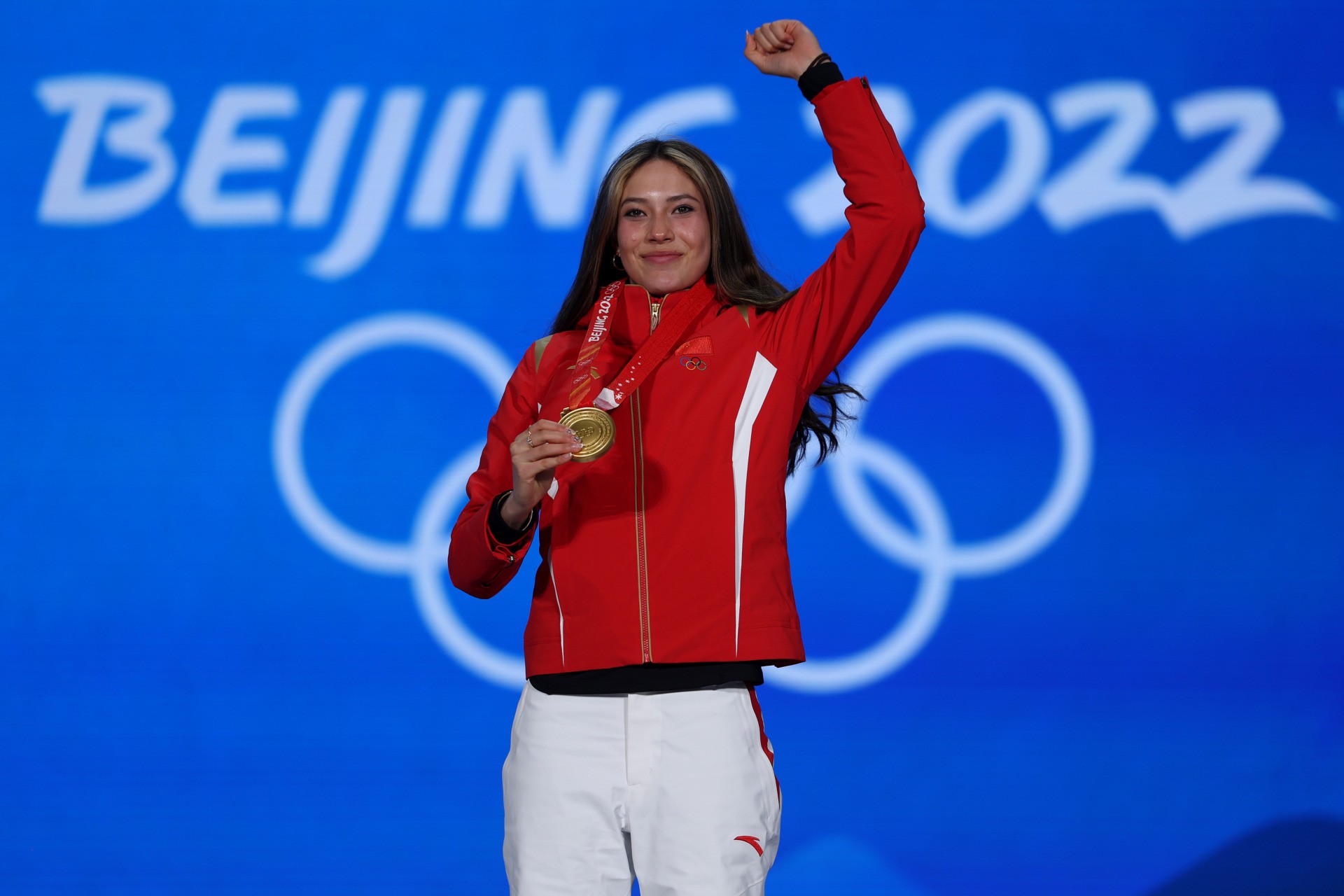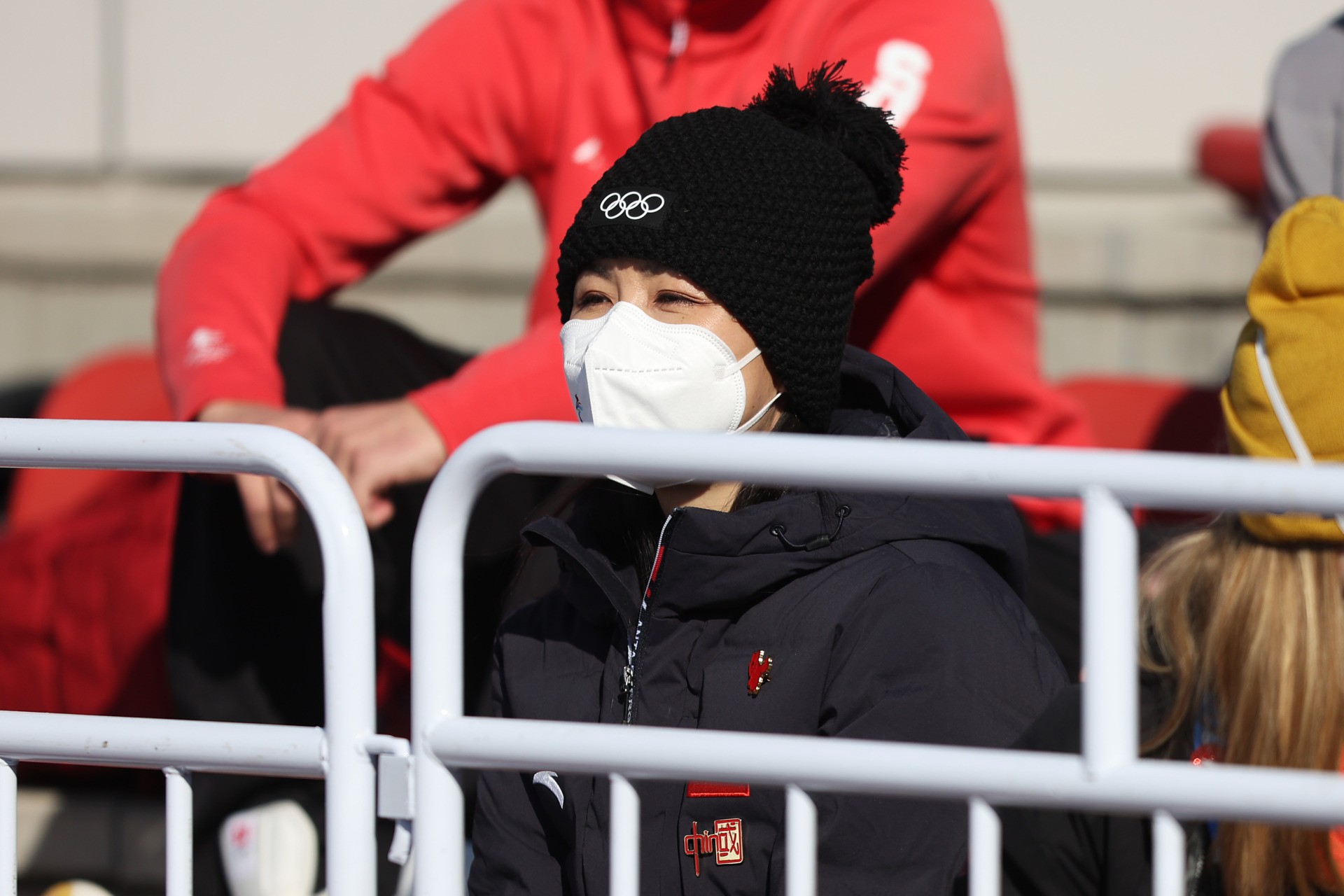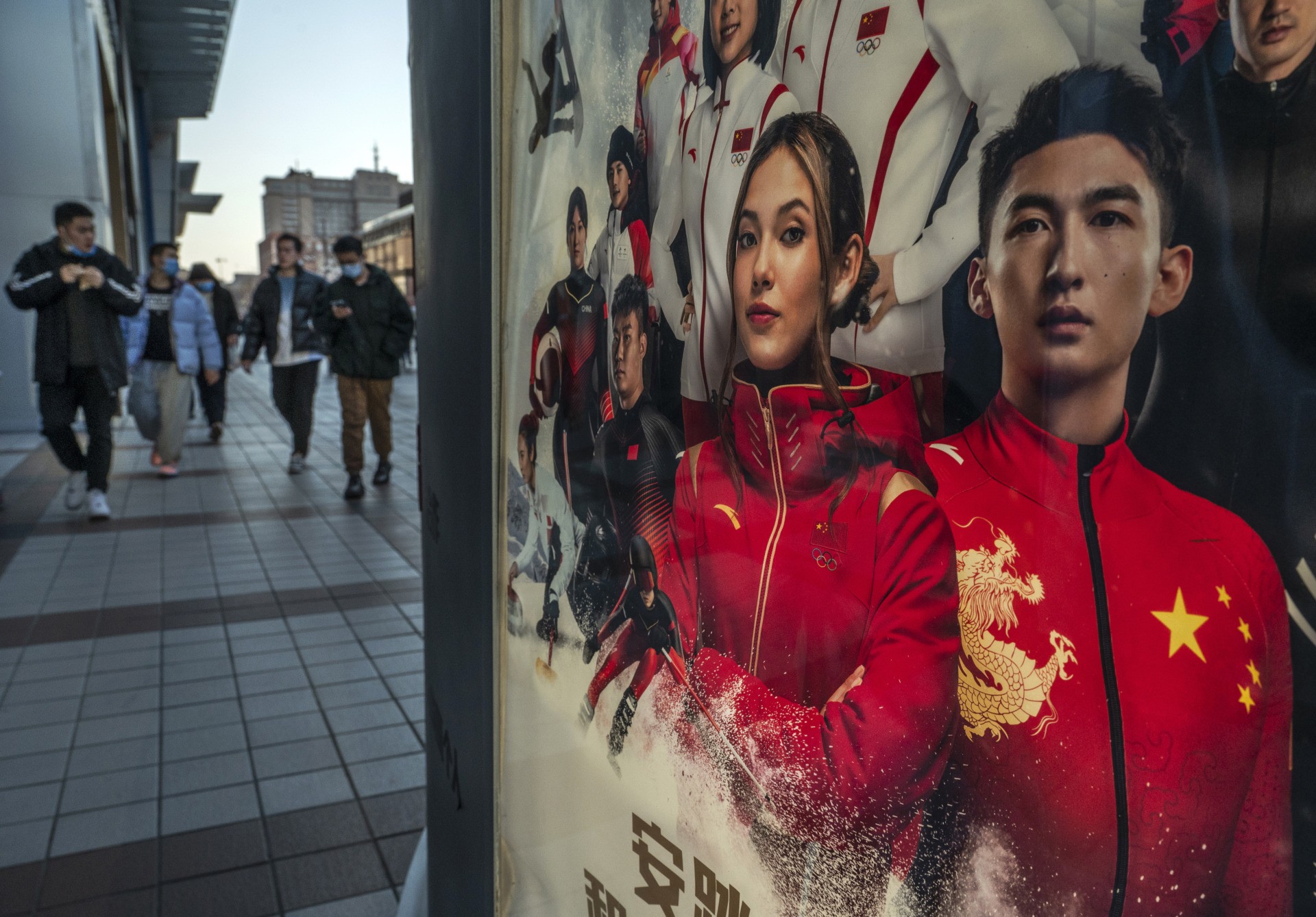Meet Genocide Barbie: Woke American-Born Eileen Gu Ditched Team USA to Win Gold for China
Eighteen-year-old freeski champion Eileen Gu gave China its first women’s gold medal of the 2022 Winter Olympics on Tuesday, becoming the breakout star of the least-watched Games in TV history. Chinese state media is eager to use Gu for propaganda while protecting her image as a globalist megastar, while American media is reluctant to ask tough questions about why a California teen would put her incredible talent at the service of a genocidal slave-taking dictatorship.
Why did a top American athlete who claims to be socially conscious, who benefited tremendously from growing up in the United States, choose to play for a brutal totalitarian government with one of the worst human rights records on the planet? Why does a young woman who claims to be devoted to female empowerment support a regime that forcibly sterilizes Uyghur Muslim women?
Why are so many American media outlets unwilling to put those questions to Gu, or even push for a firm answer on whether she renounced her American citizenship to play for China? U.S. mainstream media has largely embraced the narrative of Gu as a brave iconoclast walking a tightrope between feuding superpowers, fending off unreasonable criticism from a few cloddish and possibly racist American nationalists — as though she had left California to play for Canada, rather than for a hostile authoritarian superpower with a penchant for ethnic cleansing.

Eileen Gu of Team China holds up her gold medal for Women’s Freestyle Skiing Freeski Big Air on February 8, 2022, in Beijing. (Richard Heathcote/Getty Images)
Gu could easily have taken a spot on the U.S. Olympic team — she was racking up one trophy after another as an American competitor before she began entering events under the Chinese flag in 2019. On the other hand, as retired Winter X Games gold medalist Jen Hudak pointed out to the New York Post in early February, it’s unlikely Gu could have enjoyed the same sporting career if she grew up under the misogynist tyranny she now represents.
“It is not my place to judge, but Eileen is from California, not from China, and her decision seems opportunistic,” Hudak said. “She became the athlete she is because she grew up in the United States, where she had access to premier training grounds and coaching that, as a female, she might not have had in China.”
Gu was born in San Francisco, California, in 2003. Her mother is a Chinese immigrant named Gu Yan, the daughter of a Chinese government official who moved to the United States about 30 years ago, worked as a ski instructor in the Lake Tahoe area, and raised Eileen as a single mom.
Eileen reportedly still lives with her mother and grandmother in San Francisco, but there is little on the record about her American father, aside from occasional mentions in Chinese state media that describe him as a graduate of Harvard.
Her mother studied at Peking University before moving to America, where she earned a degree in biochemistry and molecular biology from Auburn, but became more interested in business, becoming a venture capitalist who advertises her expertise as an “expert in China investment.”
For her part, Eileen plans to attend Stanford University later this year. She generally refuses to answer questions from the media about her father. Her mother is a constant presence at her skiing competitions, while her grandmother joins her for social media posts, including videos made for Chinese audiences.
In addition to displaying phenomenal skiing talent at a young age, Eileen Gu has been highly successful as a fashion model, with a portfolio that includes ads for Gucci and Louis Vuitton. She has become one of the biggest celebrities in China, with tremendous exposure through both her modeling career and fawning state media coverage.

Eileen Gu attends the 2021 Met Gala on September 13, 2021, in New York City. (Dimitrios Kambouris/Getty Images for The Met Museum/Vogue )
In January 2019, Gu competed in the World Cup finals in Italy as the youngest member of the U.S. freeski team. Three years younger and three inches shorter than she is today, she pulled off a stunning upset and vaulted from fourth place to first with an amazing performance on a course that had tripped her up several times. The vivacious young athlete accepted a gold medal, joyously belted out the Star-Spangled Banner — and then climbed aboard a plane to China for a hush-hush meeting with dictator Xi Jinping.
A week later, Gu was wearing Chinese Communist colors and listening to an indoctrination speech from Xi as part of China’s 2022 Olympic team. The dictator told Gu and her new teammates that winning Olympic gold was crucial to “the nation’s great rejuvenation.” Gu then posed with Xi and the rest of her team beneath the Communist flag.
It was not until June 2019 that Gu publicly announced her decision to forsake the country of her birth and play for the genocidal regime in Beijing. She did it on Weibo, the heavily-policed microblogging platform Chinese subjects are required to use because the social media platforms employed by the rest of the world are restricted to Communist Party officials and propagandists.
Gu declared herself “proud” to represent the regime, expressed hope that extreme sports could become “a means through which people in China and the United States can enhance their communication, understanding and friendship” — and then wrote a follow-up post in which she portrayed herself as a soldier reporting for duty.
Despite these nauseating displays, Gu today insists she is a non-political citizen-of-the-world whose goal is to bring China and the U.S. together with her love of sports.
“I am proud of my heritage, and equally proud of my American upbringings,” she said in the June 2019 Instagram post in which she informed American fans of her decision to play for China in the Olympics.
“The opportunity to help inspire millions of young people where my mom was born, during the 2022 Beijing Olympic Winter Games is a once-in-a-lifetime opportunity to help to promote the sport I love,” she said.
The Washington Post quoted her defending herself as a unique and fully independent individual on Tuesday, in a glowing article entitled “Eileen Gu Is An Original, and the World Is Going to Have to Deal With It.”
“I compete for myself, and I’m the one who did the work,” Gu said. “I’m the one who put in the hours, and there were no cameras in the gym when I worked 8-10 hours of fashion work and then went to the gym afterwards. There were no cameras when I was hiking up before the lifts closed at 4 p.m. to get another hit in. There were no cameras when I was running half marathons every week over the entire summer. So I think those are the hours that I put in, and so in that sense, I was doing it for myself.”
“Here’s the thing: I’m not trying to keep anyone happy,” she continued. “I’m an 18-year-old girl trying to live my best life. I know that I have a good heart and know that my reasons are for the common interest and greater good. No matter what I say, if people don’t have a good heart, they won’t believe me because they can’t empathize with people who do have a good heart.”
The Washington Post breezily dismissed Gu’s critics as “haters” and gushed, “Everyone wants a piece of Gu, but she’s wise enough to reserve the biggest piece for herself. She competed for China, but she’s not exactly China’s Gu. She is a proud Californian, but she’s not exactly America’s Gu.”
A somewhat more skeptical New York Times profile last week noted that both Gu and her mother refuse to discuss any subject that would displease the regime in Beijing. After winning a major halfpipe contest in Colorado in December, Gu looked distinctly uncomfortable when China’s human rights abuses were mentioned, gave her agent a chance to halt the interview, and then shut it down herself.
‘There’s no need to be divisive. I think everything I do, it’s all about inclusivity. And it’s all about making everybody feel as connected as possible,” she said — a dicey choice of words when the enslaved Uyghur Muslims and oppressed Tibetans are harshly punished for trying to “connect” with anyone.
It is difficult to believe Gu could possibly be ignorant of China’s atrocities. Her coaches invariably describe her as well-read and highly intelligent. In the United States, she describes herself as an “outspoken” advocate for social justice causes, including gender issues, anti-Asian violence, and Black Lives Matter.
“I remember at the beginning of the pandemic, I was with my grandma in a Walgreens in San Francisco and this haphazard, haggard man runs in screaming profanities about Asian people and how they were bringing the virus in and how it was super dangerous. I don’t think I’ve ever felt fear like that in my entire life,” Gu told the South China Morning Post (SCMP) in March 2021.
“I have always been really outspoken in all matters, not just race but gender too. I’m very comfortable with these topics because they are very important. During the Black Lives Matter movement, I wanted to do my part as an ally. Obviously I’m never going to fully understand the kind of oppression that [African-Americans] go through. But it’s so important to stand by, support and amplify those voices that are so often silenced,” she said.
Gu is particularly proud of her advocacy for women’s issues, which makes her apparent willingness to cooperate with the Chinese Communist regime on the silencing and reprogramming of tennis legend Peng Shuai particularly disappointing.
When she won the gold medal on Tuesday, Gu said she was inspired by the opportunity to “encourage more girls to break their own boundaries.” Peng was in the audience, and rather than speak out against Peng’s mistreatment after she accused a high-ranking Communist official of raping her, Gu said she was “honored” to have the three-time former Olympian in the stands.
“I’m really grateful that she’s happy and healthy and out there doing her things again,” Gu said, refusing to answer any other questions about Peng.

Chinese tennis player Peng Shuai watches from the stands as Eileen Gu competes during the Women’s Freestyle Skiing Freeski Big Air Final of the Beijing 2022 Winter Olympic Games on February 8, 2022. (Richard Heathcote/Getty Images)
Gu fits comfortably into a distressingly long list of star American athletes who speak out on social issues in the United States, but fall absolutely silent when the conversation turns to China, which is practicing actual slavery right now. The regime in Beijing has demonstrated its willingness to crush the Chinese business interests of foreigners who displease it.
Eileen Gu would have a lot to lose if the Chinese tyranny decided to punish her for speaking out, or unleashed its horde of nationalist “netizens” to conduct one of their orchestrated boycott campaigns against her. Gu says she received threats and hate mail after she announced she would compete under the Chinese flag; if she ever dares to criticize the Chinese Communist Party, she and her family will find out what hatred and threats really look like.
Chinese luxury goods magazine Jing Daily hailed Gu as “China’s hottest commodity” and a “marketer’s dream” on Tuesday, predicting her gold medal win will boost her already stratospheric value as a model and brand ambassador into orbit.
【爱玲】As we count down the hours till Beijing’s Winter Olympics opening ceremony, a moment for our third VOGUE+ guest editor, 18-year-old freestyle skiier, model and dreamer, Eileen Gu. (ph: Davit Giorgadze) ⛷️❄️☃️ pic.twitter.com/Zy8uFIB5Nl
— Margaret Zhang 章凝 (@MargaretZhang) February 4, 2022
Even before she became a gold medalist, she had over 20 big endorsement deals in China, including the titanic state-run Bank of China and People’s Insurance Company of China, as well as the Chinese operations of Western brands like Kohler and Cadillac. Contracts with the young Olympian are worth over $2.5 million a pop.
One of Gu’s highest-profile advertising deals is with lingerie company Victoria’s Secret, a brand declining in much of the West but exploding in China. The Bank of China, which for all intents and purposes is the Chinese Communist government, also has suspicious dealings with President Joe Biden’s son Hunter which are currently under investigation by the Internal Revenue Service.
Marketing experts predict Gu’s endorsement and advertising value in the United States will soar as well. The athlete has evaded numerous direct questions about whether she renounced her American citizenship to play for China, as fellow Beijing Olympian Zhu Yi did.
Gu dodged the citizenship question three times in a row on Tuesday, repeatedly stating her gratitude to both America and China for her athletic career and insisting she is just a “kid” with a “good heart,” no matter what flag she competes under. The press conference moderator intervened to prevent reporters from asking the question a fourth time.

Eileen Gu’s face is seen on a billboard in a Beijing subway car on January 13, 2022. (Kevin Frayer/Getty Images)

Eileen Gu is prominently displayed in an ad in Beijing for Chinese sportswear company Anta on February 8, 2022. (Kevin Frayer/Getty Images)

A poster of Eileen Gu is displayed at an official merchandise shop for the Beijing 2022 Winter Olympics on October 27, 2021, in Beijing. (Kevin Frayer/Getty Images)
Chinese state media claims Gu became a naturalized subject of the Chinese Communist government three years ago, a transition that would have required renouncing her American citizenship, since China does not recognize dual citizenships.
Canada’s Globe and Mail observed over the weekend that China’s team includes some foreign players who apparently were not required to become Chinese citizens.
The South China Morning Post reported last week that some online Chinese nationalists are worried that Gu might have been granted some extraordinary dual citizenship arrangement, or that she might be insufficiently loyal to China.
“I’m curious about her stating that she’s American when she’s in America, and Chinese when in China in interviews with foreign media. Her name is not on the list of people who have given up U.S. citizenship on the Federal Register, foreign media reported that she has dual citizenship. What do people think? Is this tacit acceptable?” one disgruntled Weibo user asked.





Comments are closed.